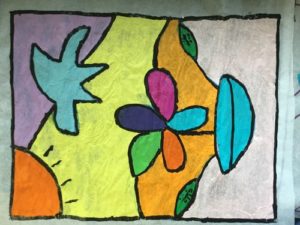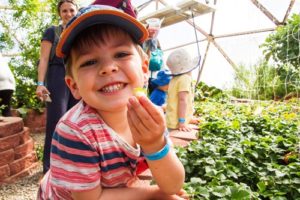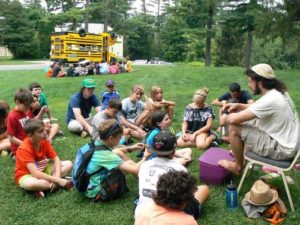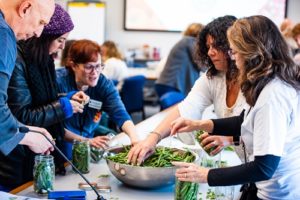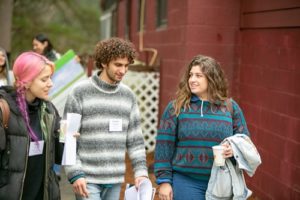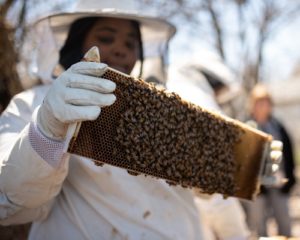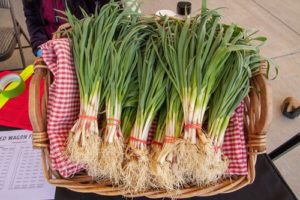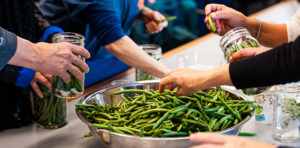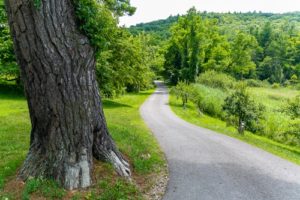Hazon Educational Library: Curriculum
Tie-Dye and Tekhelet
by Stephanie Salem
de Toledo High School
This program introduces participants to natural tie dyes, introduces the concept of tchelet, and is meant to help participants enhance their observation skills by considering what natural materials could lend themselves to different colored dyes.
Age(s): Teens
The Joys of Sukkot
by Sarah Julia Seldin
Jewish Farmer Network
This program leads a discussion through text of the significance of joy to Sukkot and how Jewish tradition teaches us to inhabit that joy through generosity and hospitality.
Age(s): Adults, High School
Tasting the Torah, Torah as a Food Memoir of the Jewish People
by Sarah Rockford
Colby College
There are anecdotal stories about food throughout the Torah. These food-cameos are, perhaps, even more instructive in the origins of Jewish food culture than the direct instructions about what may be eaten.
Age(s): Adults, High School
Exploring the Water Cycle and Hebrew Holidays
by Jessica Wolfe
Isabella Freedman
Students will learn how the Jewish holidays relate to the water cycle. We will look at the water cycle of North East United States & Israel to compare and contrast the differences between the water cycles in each region and the holidays that occur during those times.
Age(s): Middle School
Let’s Eat! Why Do We Eat Together?
by Cole Siegel
Isabella Freedman
This program is designed to be primarily a discussion based around eating, looking both at Jewish texts as well as secular contemporary sources.
Age(s): Adults
Pasture Politics: Exploring the Tragedy of the Common
by Clara Feigelson
Pearlstone Center
This program is an introduction to collective responsibility as humans to each other and the Earth in the context of games.
Age(s): Adults, Middle School
Jewish Food for Thought: Caring for Pollinators
by Beth Denaburg
Shoresh
The series of programs focuses on the interconnections between Judaism, nature, and food - aiming to explore the threads of interconnectedness that bind people, plants, pollinators, soil, and Jewish traditions.
Age(s): Youth
Making Grape Juice
by Rebecca Leung
Abundance Farm
This program is a lesson on making grape juice from grapes. Participants will have the opportunity to discuss what makes grape juice holy.
Age(s): Middle School
Rosh Hashana Symbolism Through Food
by Sara Just-Michael
Grow Torah
A Rosh Hashana seder during which you will be connecting food to different intentions for the new year.
Category: Jewish Food traditions, Shabbat and Holidays
Age(s): High School, Middle School
Nonviolent Communication with Young Children
by Maddy Winard
Urban Adamah
This program is intended to showcase the social emotional learning content we provide our campers and camp staff with in both camp staff training, and on a daily basis. The program includes a beginning intro to nonviolent communication (NVC), games, and practice.
Category: Group-building
Age(s): Adults
Intro to Privilege and Oppression
by Cole Siegel
Isabella Freedman
This program will provide a basic understanding of concepts such as privilege, oppression, power, socialization and identities. It will provide definitions and explanations of concepts so that participants will be able to have a shared language.
Age(s): Adults
Where Does Your Food Come From?
by Stephanie Salem
de Toledo High School
This program will introduce participants to the Jewish brachot over food and educate them about the food supply chain.
Age(s): Young Adult
Eco-Kosher: Innovation in Jewish Tradition through an Environmental Lens
by Sarah Rockford
Colby College
How can we use concepts of environmentalism to augment and evolve our understanding of what constitutes kosher food? What if we draw on the concept of kashrut and go beyond it to try out a new word: eco-kashrut?
Category: Environmental Justice, Food Systems & Food Justice, Jewish Food traditions, Sustainability
Age(s): Adults
Judaism and Immigration Justice – What the Book of Ruth has to Teach
by Liana Rothman
Isabella Freedman
This program will be a poetry workshop preparing teens or adults for Tikkun Leil Shavuot (all night studying) through an immersive and meaningful poetry workshop.
Category: Shabbat and Holidays, Social Justice
Age(s): Adults, High School
Topsy Turvy Bus
by Hannah Fine
Hazon Detroit
This curriculum engages students with the Topsy Turvy Bus and its sustainable attributes and teaches about sunlight and vegetable oil as alternative energy sources.
Age(s): Early Childhood, Middle School

